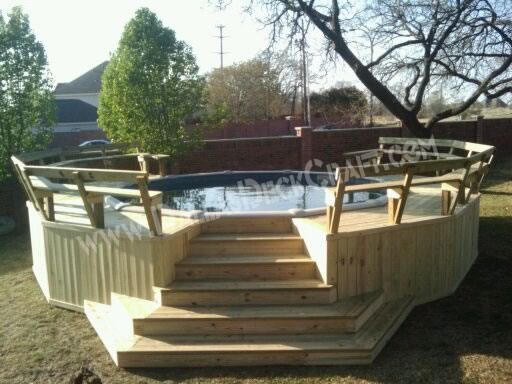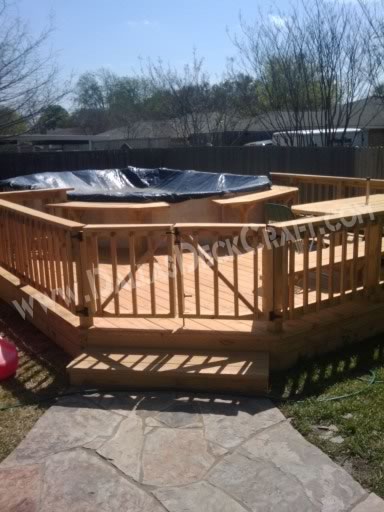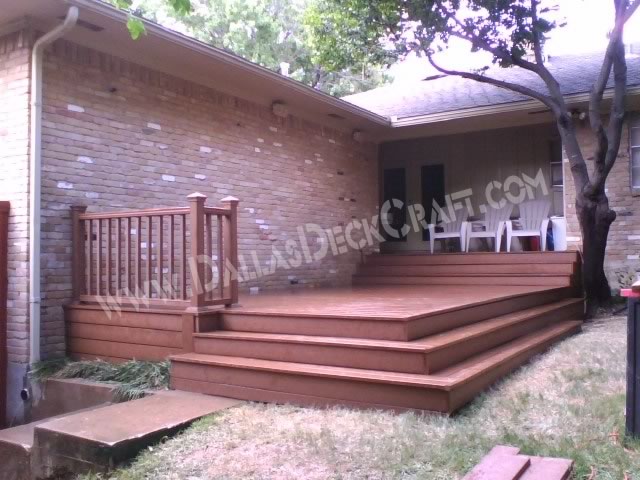Tag Archives for " decking for above ground pools "

Have An Above Ground Pool Deck Put In To Get The Most Pleasure Out Of Your Above Ground Swimming Pool
Above Ground Pool Deck Ideas
There are a wide range of above ground pool deck ideas, plans, and materials (round, oval, side, rectangular, concrete, wood, stone, rock, etc.).
Above Ground Pools Are Popular
In backyards all across the U.S., above ground swimming pools are popping up. There are approximately four million of these types of pools in America, and almost 200,000 of them are sold annually. It’s really easy to understand why above ground pools are so common: They’re inexpensive, easy, and quick to install, and they require hardly any maintenance.
Above Ground Pool Decks Are Essential
In order to the get the most pleasure and enjoyment out of an above ground pool, however, you need a deck that surrounds it. Say goodbye to the pool ladder, and say hello to a fun-in-the-sun get-together hangout spot for your family and friends. It will give you a nice place to wine, dine, sunbathe, and swim–or just visit.
Decks for Above Ground Pools: How & Why
- An above ground pool is often put in because a raised platform provides easy access to the pool
- Deck contractors can be hired to design, develop, and install an above ground pool deck
- For a low price, you can significantly improve the aesthetics, enjoyment, and look of your pool and backyard as a whole
- There is usually no need for any excavation
Advantages of an Above Ground Pool Deck
- A raised deck will completely negate the need for excavation, leaving your backyard free of shovels, equipment, digging, and damage.
- Makes unwanted pool access a lot more difficult for pets and children.
- An above ground pool deck has sidewalls that will keep debris and leaves from blowing in.
An Above Ground Pool Deck Makes Backyard Parties More Fun
A beautiful and expansive pool deck is the first thing that guests and family will notice about your pool when they come to visit. An above ground pool deck should be big enough to have plenty of space for lounge chairs, benches, container plants, and anything else-decorative or playful-that would normally be placed on a deck.
An above ground pool deck, with the right planning, can make an above ground pool look like an in ground pool. Or, an above ground pool deck can be built such that that the pool will look raised and keep out unwanted visitors.
Above ground pool deck designs are what really give pools their signature looks. There are hundreds of common designs and thousands of custom-built ideas that planners, builders, and developers come up with every day. Indeed, about 200,000 above ground pools are installed in backyards in America each year. Whether you get a wood, composite, or pressure-treated deck, don’t make the decision without consulting deck contractors first. Go over the plans with them, and discuss the advantages and disadvantages of each material. It’s not a decision you should make without sufficient consultation.
An Above Ground Pool Deck is a Work of Art
An above ground pool deck, elevated off the ground, can look striking and impressive to backyard guests and family friends. When it comes time for those summertime parties, you’ll be thankful that you put in an above ground pool deck.
Above ground pools and above ground pool decks have been mass manufactured since the 1950s. Wise consumers who want the permanent look of an in-ground pool with a lower price tag have historically opted for an above ground pool. Spending money on the deck is a better use of funds, and investing a lot of money in a beautiful and well-designed deck can add a whole new dimension to the look of your backyard and your home as a whole.
If you’re not a fan of the above ground look, you can always look into designs that can be sunken–or buried–in the ground. Your house visitors might not even be able to tell it’s actually an above ground pool.
A deck can be any shape, e.g., rectangular, oval, or square, while the pool itself is of a different shape.

The Things They Don’t Tell You About Building Above Ground Pool Decks
Above ground pool decks do not only allow easier access in and out of the water; they also provide aesthetic improvement to your pool and enough space for outdoor activities to be enjoyed near it. There are several factors that must be considered by any homeowner planning to have a pool deck installed, and this article discusses them in detail.
In the past, above ground pools were just an alternative to the more common in-ground pools. But because of the economic downturn and the rising (often prohibitive) costs involved in constructing in-ground pools—apart from the intensive process—above ground pools have become a more popular choice.
New design concepts are being applied to allow plenty of room to lounge by the poolside, in the form of above ground pool decks, which are decks elevated to match the height of the pool. They can be stand-alone or be connected to the back part of the house.
Above Ground Pool Decking—Three Main Categories
An above ground pool deck can be built in any shape and size, depending on your preferences, budget and how you want to use the deck. There are three main categories to break them down and each of these designs has its own pros and cons. Let’s take a closer look at each one.
Full-Surround Decks
This design surrounds the perimeter of the pool, and is the most popular above ground pool decking choice. These decks are typically circular in shape, and they are strategically constructed so that the inner edge lies close to the pool. This design allows you to enter the pool from any point while hiding its walls.
A full-surround deck also makes cleaning and maintenance easier because you can go around and walk on all sides of the above ground pool. One disadvantage to this type of pool decking, however, is it does not offer ample space for lounging and other activities. This design would also need more supports than the other deck types.
Side Decks
A side deck is built close to the side of the pool but does not surround its perimeter. There are designs that are in rectangular or square shape, however, crescent and round shaped designs are also popular. The size varies, too, from just being big enough for the pool ladder to be anchored, to being large enough to allow lounge chairs, a picnic area and a grill.
Combination
An above ground pool deck can also be designed using both a perimeter deck and a side deck, an option that gives the pool owners the best of both designs. The combination design completely hides the walls of the pool while allowing you to walk around the pool’s edge. There is also an area on one of its side that offers enough space for outdoor activities, lounging, grilling and even a jacuzzi.
This is the best option if you plan to connect your above ground pool deck to your porch or another deck. Take note, though, that the cost of building a deck this way will be much more since you are actually having two decks built. It is always best to consult with your local deck contractors and explain your plans in detail.
Above Ground Pool Deck Materials
One of the most important decisions a homeowner has to make when it comes to building a deck is the material that will be used, primarily because it affects the lifetime of your deck and of course, your budget.
For discerning homeowners looking to add elegance, opulence and natural beauty to their homes, the best choice is wood decking. The richness of the wood provides a rich contrast to the man-made materials used to construct the pool. If you choose the right wood to be used and understand the maintenance and care required for wooden decks, the beauty of your deck will last a long time.
Here are some of the most popular wood deck choices:
Pine—is a classic choice for outdoor decks. It is highly popular among Dallas, Texas builders and homeowners because pressure-treated pine is attractive, easy to use, and relatively low maintenance. It is readily available, so it is less expensive than other wood types.
Balau—an exotic wood known for its durability. It requires little-to-no maintenance. This wood has natural oils that act as water-retardant and keeps the wood from cracking and becoming brittle.
Redwood—this type of wood is great for pool decks because it is very durable and it does not shrink or break even when constantly exposed to dry and wet conditions. It also has natural resins and oils that repels insects, and prevents decay and rot from occurring.
Ipe—this beautiful, dark Brazilian hardwood is harder than nails, so an above ground pool deck built with ipe will surely last decades. It is also fire resistant and has natural oils that make insects hate it. Ipe is considered to be the Ferrari of hardwoods for decking.
Important Things to Remember When Choosing Wooden Decks
Wooden above ground pool decks require a lot of love and care, so you must be prepared maintain them.
They should also be built by a professional deck builder who fully understands deck building, someone who can also guide you through the selection and planning process.
If your home is in Dallas, Texas, for example, you should work with a local professional deck builder like the experts at DallasDeckCraft.com who has more than 30 years of experience in above ground decks. These professionals can get the job done right because they know the weather, the temperature and soil conditions around the area, as these are important factors to consider when choosing the best materials for your pool deck.

Above Ground Pool Decks
Above Ground Pool Decks Turn an Ordinary Pool into a Beautiful and Versatile Outdoor Living and Lounging Center
Above ground pool decks make so much sense for a number of reasons. Your old above ground pool just isn’t what it used to be. At a fraction of the cost of an in-ground pool, you made a wise financial decision. And with an average daily temperature more than 10 degrees higher than the rest of the United States, that cool, refreshing pool is sometimes a real lifesaver.
But the sides are starting to show wear and tear, and if you had to be honest with yourself, it is just downright unappealing looking. If you are not ready to install an in-ground pool, due to the extreme cost or other reasons, maybe an above ground pool deck is the answer. This way, you get the best of both worlds.
You get the convenience and ease of use of an in-ground pool, and the low cost of an above ground pool. And you may be surprised at just how quickly and inexpensively a professional Dallas deck builder can construct a beautiful and versatile above ground pool deck which will make you the envy of the neighborhood.
Above Ground Pool Decks Expand Your Outdoor Living Options
By building a natural or composite deck around your pool, you extend its capabilities. Now you own more than just an unattractive and elevated swimming hole. You can create an outdoor centerpiece with a lounging area, make room for a barbecue, and install built-in seating.
And when your professional deck builder has years of experience in creating above ground pool decks for your very neighborhood and the surrounding Dallas Metro area, you get a well-made and long-lasting product.
Think about it. You can finally get rid of that rickety old ladder hanging from the side of your pool. Not only does it look bad, but it can be unsafe as well. How about some gorgeous, built-in steps that the lead your eyes and your footsteps right up to the inviting water that promises to wash away your stress and troubles?
It is a lot easier, and safer, to walk up five or six sturdy, durable and wide deck steps than it is to climb into your elevated pool the way you are doing it now.
Look, a pool is an extravagance, not a necessity. You bought it because you and your family and friends deserve and enjoy relaxing and splashing around at the end of a long day or work week. So reward yourself further, and transform your simple and boring pool into a multi-use backyard living and lounging space with an above ground pool deck.
A swimming pool provides a permanent vacation atmosphere. No matter how frustrating or rough your day is, you know your pool is right there to wash away the blues. So why not raise the level of your family’s outdoor experience with an above ground pool deck?
When you call us for an estimate, you get the benefit of our decades of experience building all types of Dallas above ground pool decks. So give us a ring right now, and we will be happy to turn your unattractive and plain backyard pool into a versatile outdoor living center that will make every day a vacation.

A Brief Overview of the Benefits of Composite Decking
In the past decade or so, advancements have significantly improved the quality of composite decking, yielding a material that is stronger, longer-lasting, and less prone to warping, deterioration, and other common problems associated with outdoor wooden construction.
How is Composite Decking Made?
Composite decking is generally made from the combination of wood and plastic (hence composite). The wood is usually sourced from lumber byproducts such as wood chips, fibers, and sawdust. The plastics used are often recycled polyethylenes (but not always—you’ll have to confirm with the product manufacturer).
Producers of composite decking take the wood and the plastic products and heat them up, at which point coloring and a preservative agent are added to the “wood soup.” Finally, the mixture is poured into casts to form boards. Once it hardens, the composite decking is ready to be shipped to your local supplier.
The Best Uses for Composite Decking
Composite decking has become a popular choice for outdoor decks as a result of its durability and resistance to weathering. Composite woods are also more resistant to moisture, making them a great choice for humid areas or as decking for above ground pools.
There are two kinds of composite decking: hollow and solid. Hollow decking isn’t as popular as solid decking, as it tends to look less realistic and isn’t as sturdy as its counterpart, but it does carry the benefit of being less prone to temperature and moisture related expansion and contraction.
Solid composite decking can contract and expand more, but is generally more durable and strong. Which type you choose is largely dependent upon the intended use of the deck and the temperature conditions where you live.
The aesthetic appeal of composite wood has also substantially improved over the years—while a trained eye might still be able to spot it, as it’s not a perfect 1:1 replica of “real” wood, composite wood can often look very natural and pleasing.
A wide variety of grains, colors, and other options are available to homeowners—matching composite wood to the already-existing wood in your home is generally a fairly easy process.
Most composite decking comes with a fairly long warranty—as this material is designed to last quite a long time—but homeowners should be aware that in order to take advantage of the warranty, the deck has to be built according to the manufacturers directions.
Hiring a professional deck builder ensures that your warranty will be valid for years to come.
Composite wood can also be used for parts of your outdoor deck other than the deck itself; for example, suppose you had your deck built out of Trex composite decking. Trex also makes railing out of composite wood, meaning that your entire project can remain uniform.
As a final note, composite decking does require maintenance, though this maintenance is generally considered a bit less intensive than natural wood requires. Typically, composite decking must be cleaned at least once per year.
Composite Decking Prices
In addition to its improvements over the past few years, the cost of composite decking has also become much more affordable.
However, a common misconception is that composite decking is significantly cheaper than “real” wood—while this can be true, it isn’t always the case. Just like natural woods, the price of composite decking will vary based on quality and type.
Whether you decide to build your deck using composite decking or natural wood decking, you can expect to find prices similar to each other which offer different benefits—therefore, the smart move will be to base your purchase on the intended use of the deck (e.g., an above ground pool deck may benefit from composite wood’s resistance to moisture).
